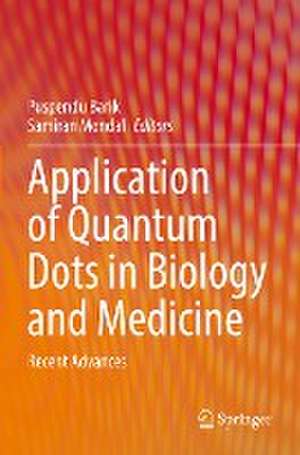Application of Quantum Dots in Biology and Medicine: Recent Advances
Editat de Puspendu Barik, Samiran Mondalen Limba Engleză Paperback – 5 oct 2023
| Toate formatele și edițiile | Preț | Express |
|---|---|---|
| Paperback (1) | 639.73 lei 6-8 săpt. | |
| Springer Nature Singapore – 5 oct 2023 | 639.73 lei 6-8 săpt. | |
| Hardback (1) | 646.11 lei 6-8 săpt. | |
| Springer Nature Singapore – 4 oct 2022 | 646.11 lei 6-8 săpt. |
Preț: 639.73 lei
Preț vechi: 752.63 lei
-15% Nou
Puncte Express: 960
Preț estimativ în valută:
122.43€ • 126.47$ • 101.89£
122.43€ • 126.47$ • 101.89£
Carte tipărită la comandă
Livrare economică 26 martie-09 aprilie
Preluare comenzi: 021 569.72.76
Specificații
ISBN-13: 9789811931468
ISBN-10: 9811931461
Pagini: 268
Ilustrații: XIV, 268 p. 51 illus., 45 illus. in color.
Dimensiuni: 155 x 235 mm
Greutate: 0.4 kg
Ediția:1st ed. 2022
Editura: Springer Nature Singapore
Colecția Springer
Locul publicării:Singapore, Singapore
ISBN-10: 9811931461
Pagini: 268
Ilustrații: XIV, 268 p. 51 illus., 45 illus. in color.
Dimensiuni: 155 x 235 mm
Greutate: 0.4 kg
Ediția:1st ed. 2022
Editura: Springer Nature Singapore
Colecția Springer
Locul publicării:Singapore, Singapore
Cuprins
Introduction to Quantum Dots.- Synthetic Developments of Semiconductor Quantum Dot for Biological Applications.- All-Optical Detection of Biocompatible Quantum Dots.- A Toxicologic Review of Quantum Dots: Recent Insights and Future Directions.- Advantages And Disadvantages of Using Quantum Dots in Lateral Flow and Other Biological Assay Formats.- Recent Developments in Quantum Dots Technologies as Effective Theranostic Tools Against Cancer.- The Underlying Mechanism of Quantum Dot-Induced Apoptosis: Potential Application in Cancer Therapy.- Fluorescent Quantum Dots, A Technological Marvel for Optical Bio-Imaging: A Perspective on Associated In Vivo Toxicity.- Quantum Dots in Biosensing, Bioimaging and Drug Delivery.- Quantum Dots: Potential Cell Imaging Agent.- Quantum Dot: A Boon for Biological and Biomedical Research.- Upconversion and Downconversion Quantum Dots for Biomedical and Therapeutic Applications.- Present Status and Future Perspective.
Notă biografică
Dr. Puspendu Barik received his Ph.D. in Physics from Visva-Bharati University (a Central University), India, in 2013. Dr. Barik was subsequently a research associate at Visva-Bharati, India. He worked as Dr. D. S. Kothari Postdoctoral Fellow (2016–19) for his postdoctoral work at IISc, India, and DGAPA postdoctoral fellow at UNAM, Mexico (2014–16). Dr. Barik also worked as a Project Scientist – D at TRC, S N Bose National Centre for Basic Sciences, India (2019-21). Currently, he is working as an active researcher at S N Bose National Centre for Basic Sciences. His research interests include SERS, nanocomposites, photonic–plasmonic structures, evanescent waves, plasmonic luminescent solar concentrator devices, gas sensing materials using plasmonic nanocomposites. He has co-authored more than 30 publications, including research papers, book chapters, and reviews.
Dr. Samiran Mondal received his Ph.D. in Chemistry from Visva-Bharati (a Central University), India in 2012. At present, he holds the position of Assistant Professor of Chemistry in the Department of Chemistry, Rammohan College, Kolkata, India since 2015. After receiving his PhD degree, he moved to the Graduate School of Medicine, Kyoto University, Japan in 2012 as a prestigious HFSP Postdoctoral Fellow and worked with Nobel Laureate Professor Tasuku Honjo. His research interests are primarily focused on small molecules based drug discovery. In this direction, presently, he is involved in the modulation of protein-protein interaction with small molecules particularly relevant to the discovery of novel therapeutic agents for cancer therapies, development of naturally occurring small molecules and their synthetic analogs with potential antiviral efficiency, studying the mechanism of amyloid aggregation related with Diabetes, Alzheimer's disease, and other neurodegenerative diseases. Dr. Mondal has published more than 20 research papers.
Dr. Samiran Mondal received his Ph.D. in Chemistry from Visva-Bharati (a Central University), India in 2012. At present, he holds the position of Assistant Professor of Chemistry in the Department of Chemistry, Rammohan College, Kolkata, India since 2015. After receiving his PhD degree, he moved to the Graduate School of Medicine, Kyoto University, Japan in 2012 as a prestigious HFSP Postdoctoral Fellow and worked with Nobel Laureate Professor Tasuku Honjo. His research interests are primarily focused on small molecules based drug discovery. In this direction, presently, he is involved in the modulation of protein-protein interaction with small molecules particularly relevant to the discovery of novel therapeutic agents for cancer therapies, development of naturally occurring small molecules and their synthetic analogs with potential antiviral efficiency, studying the mechanism of amyloid aggregation related with Diabetes, Alzheimer's disease, and other neurodegenerative diseases. Dr. Mondal has published more than 20 research papers.
Textul de pe ultima copertă
This book illustrates various applications of quantum dots (QDs) in the biomedical field and future perspectives. It first introduces the synthesis procedures and fundamental properties of QDs. In addition, the optical detection techniques and toxicologic reviews of QDs are presented. A focus of the book is also on the applications of QDs in cancer therapy, drug delivery, bio-sensing, and targeted molecular therapy. This book is exciting and valuable to a wide variety of readership communities (students, early-stage researchers, and scientists) in the various fields of biology and medicine.
Caracteristici
Covers various applications of quantum dots in biomedical field Presents fundamental properties and synthesis techniques of quantum dots Provides contributions from experts in the field
